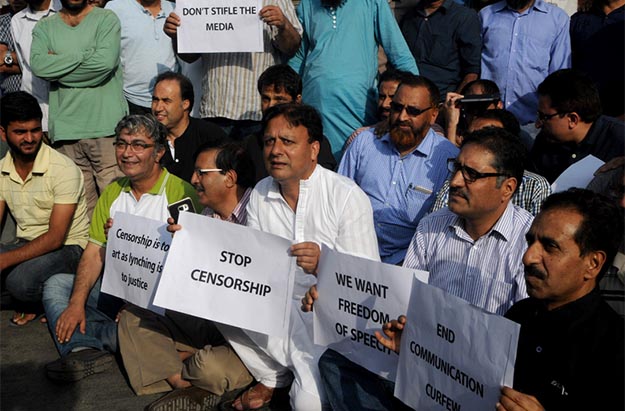Kashmir Media Decides to Resume Publication

SRINAGAR: After five days of media gag, local newspapers in Kashmir Valley wednesday decided to resume publication after a meeting with the Jammu and Kashmir chief minister Mehbooba Mufti.
Newspapers are expected to hit the stands tomorrow after Mehbooba assured the journalistic fraternity that the beleaguered government will not interfere in their work.
Cellular phone networks, however, continue to remain suspended with curfew like restrictions imposed in ten districts of the Valley where situation remains tense on thirteenth day of Hizb commander, Burhan Wani's killing.
"The chief minister told us that it was not the government's decision to implement the ban. She assured that there will be no interference from the government side in the functioning of newspapers, so we have decided to resume publication from today," Rashid Makhdoomi, printer and publisher of the largest English daily, Greater Kashmir, told The Citizen.
For the fifth day today, local newspapers failed to hit the stands even as Amitabh Mattoo, advisor to the chief minister, assured the journalistic fraternity yesterday that there was no ban on printing an distribution of newspapers.
The editors and owners of leading English and Urdu dailies published from the summer capital Srinagar and Budgam district met today afternoon here for the second time in as many days wherein they decided to resume publication after assurances from the top level.
Yesterday, the owners had refused to resume publication in the view of ban "formalised by senior cabinet minister and state government spokesman", raids carried out by the police last Saturday and "propaganda blitzkrieg" of the state government which "hit the credibility" of local newspapers.
"In wake of these developments, the editors and the owners of the newspapers regret that it may not be possible for us to resume publication of newspapers. We will review the progress on Wednesday," a statement issued after yesterday's meeting said.
In multiple interviews with the national dailies, J&K government spokesperson, Naeem Akhtar, had said that the government decided to impose the ban to prevent "attempts to subvert peace" in the Valley.
"It is an unusual situation," Akhtar said last week, "So we were forced to take such an undesirable step”.
Pakistan had a day earlier said it will observe July 19 as a “black day” to protest what it said was killing of innocent people in Jammu and Kashmir by Indian troops. adding that the move was taken “to save lives and strengthen peace efforts”.
However, Amitabh Mattoo, the political advisor, rebutted Akhtar, saying that the government was not behind the ban.
“There is no ban on newspapers .... there was some miscommunication. Papers can publish. In the age of globalisation, there is no question of imposing a ban. The Chief Minister herself believes in freedom of expression, even if it is against the establishment," he said on NDTV.
Later in the evening, the J&K government issued a statement, clarifying that there was no ban on printing and distribution of newspapers. According to an official spokesperson, the District Magistrates of Srinagar and Budgam "clarified that there is no restriction on printing and publishing of newspapers".
The gag on media has sparked worldwide condemnation with as the Committee to Protect Journalists, the global journalism watchdog, condemning the "repressive measures" of the authorities to ban local cable and newspapers in the Valley.
"The Indian government should immediately lift its ban on newspaper operations and restore the free flow of information," said Steven Butler, CPJ's Asia program coordinator.
"It's obvious that Kashmir's longstanding difficulties have nothing to do with the operation of a free press, and that preventing professional journalists from doing their jobs can only make the situation worse," he added.
Meanwhile, Facebook has been accused of censoring dozens of posts and user accounts after the death of Burhan Wani, the Hizbul Mujahideen commander whose killing earlier this month sparked an uprising in the region.
Ordinary users, academics and even some journalists said the photos and videos related to Burhan's killing were taken down and in some cases the accounts were blocked, sparking an outrage against the social media network.



